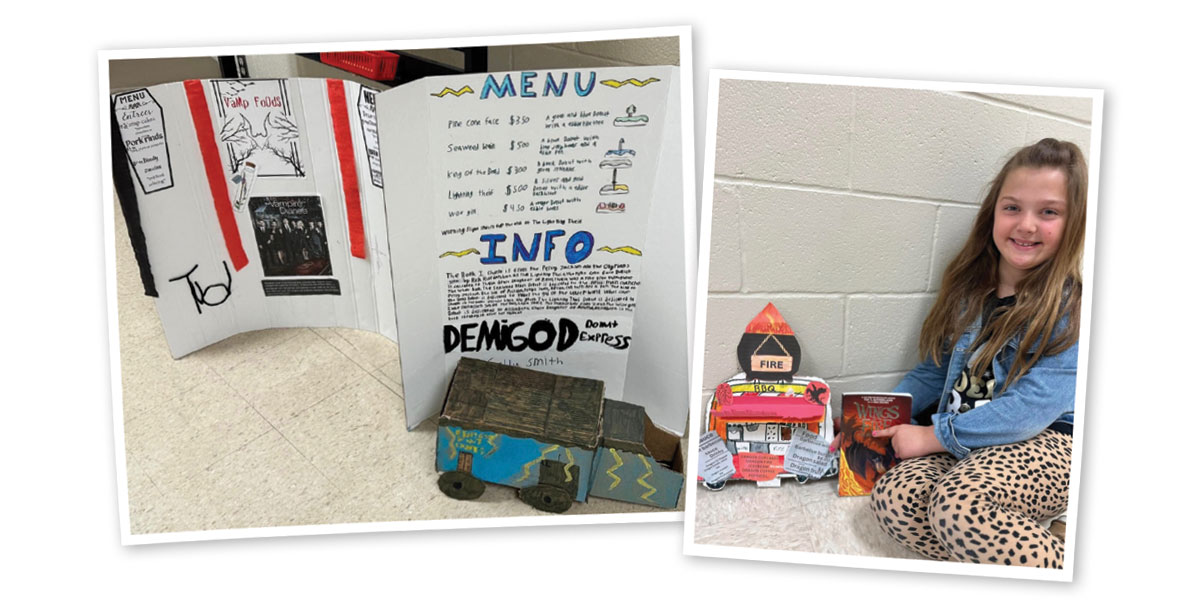Students Love Literacy Food Truck Program
Arkansas library media specialist Chelsey Smith has kids combine food truck fun with their favorite books, resulting in projects like a Captain Underpants-themed truck with "Tighty-Whitey Tacos" on the menu.
 |
Students get creative building food trucks with book-inspired menu items.Photos courtesy of Chelsey Smith |
Food trucks are a big deal in Jonesboro, AR. They’re a regular presence at high school events, so younger students wanted some food truck fun of their own. This gave Chelsey Smith, library media specialist at Nettleton STEAM Intermediate School, an idea for a program.
 |
Chelsey Smith |
Drawing on the popularity of food trucks among her third- to sixth-grade students, she created the Literacy Food Truck Festival. Students design food trucks based on their favorite books—like a Captain Underpants food truck that serves “Tighty-Whitey Tacos”—and Smith displays them during spring parent-teacher conference night, while actual food trucks in the parking lot serve hungry families.
“Everyone is invited to come in, view the food trucks, and vote on the one they feel best encompasses the book the truck represents—so the food truck owners vote, parents vote, teachers, students,” Smith says. The students are anonymous, to ensure people vote for their favorite truck rather than for students they know. The winning student receives a prize basket.
The students’ trucks must be based on a book or literary character and must feature at least three menu items connected to that book. Students can create a poster of a truck, build one out of cardboard, or create one digitally, but in the two years the competition has been running, Smith says, students have all opted to build trucks. Nettleton is a project-based learning school, so students are familiar with building things and problem-solving.
Want to start a literacy food truck program?Chelsey Smith offers these tips: Encourage teachers and administrators to create examples to display. When students see a variety of art styles and projects, they’re more inspired and confident to create one of their own. ❚◗ Set guidelines, but don’t limit students too much. “Let their imaginations run a bit wild. This makes the experience more fun for all involved.” ❚◗ Encourage local food trucks to advertise your program, especially if they’re attending. ❚◗ Don’t limit students’ project work to “at-home” time. “Students have busy lives, too, and schoolwide programs should include opportunities to work at school and use school resources.” This makes the program open to students who can’t work at home. |
This year’s winning truck was based on Detective Beans and the Case of the Missing Hat by Li Chen, a graphic novel about a feline detective who loves ice cream. The student created an ice cream–themed food truck with a large magnifying glass on top.
Other students’ projects have included a truck based on Kayla Miller’s Click, which served items characters ate or drank in the book, like boba tea and sushi; a beach-themed truck, based on a “Baby-Sitters Club” book, with starfish wheels and a working steering wheel; a truck based on Tui T. Sutherland’s Wings of Fire serving hot foods that “fire-breathing dragons would like to eat”; and one themed on Lauren Tarshis’ I Survived Hurricane Katrina that resembled a storm tracker truck.
Students, working alone, can create their trucks at home or during class time, in either of the school’s two makerspaces or in the library. Students like using the library space so they can ask her questions about their books, according to Smith. Working individually, rather than in a group, “helps them build that independence at a young age, because they do a lot of group projects in the PBL [problem-based learning] curriculum,” she says.
The completed trucks are displayed on a table outside the library, and students walk by and admire them. Students are respectful of the different ages and skill levels involved when they see everyone’s work, she says. “To see sixth-graders praise third-graders’ work was nice,” she says.
She thinks the creativity of the project resonates with students: “We talk a lot about reading for joy, finding those books that are mirrors. But this caused them to actively engage with their favorite library books.”
As the students analyze a character’s choices and personality development, “they’re taking those books they read for joy and critically thinking about it without a teacher saying, ‘Okay, here’s a list of questions: What did this character go through? How can you tell this character grew?’ They’re naturally doing that on their own as they create this project.”
Smith, who came to librarianship after teaching high school English, said the Literacy Food Truck Festival has been a hit with students. “The kids always ask, ‘When are we going to start Literacy Food Truck?’”
She’d like to get even younger students involved. Nettleton STEAM Elementary School has opened next door for pre-K through second grade, and Smith hopes to have those students create something simpler, like a book–themed dinner dish. Ultimately, Smith would like to see Literacy Food Truck become a district-wide event.
“The night where it all comes together” for parent-teacher conferences is one of Smith’s favorite times. Parents see their children’s work, talk to the teachers, buy from the food trucks, and then eat as a family in the library or on benches outside.
“I just love seeing a whole family talk about a book that their child really enjoyed,” she says.
The real-life food truck owners benefit as well. Many of the trucks are locally owned and are so popular students ask for them, she says, “Like, ‘Is Mrs. B’s Grilled Cheese going to be here again?’ It’s a whole community. I love it.”
Marlaina Cockcroft is a writer and editor with a passion for children’s books.
RELATED
The job outlook in 2030: Librarians will be in demand
The job outlook in 2030: Librarians will be in demand
ALREADY A SUBSCRIBER? LOG IN
We are currently offering this content for free. Sign up now to activate your personal profile, where you can save articles for future viewing






Add Comment :-
Be the first reader to comment.
Comment Policy:
Comment should not be empty !!!